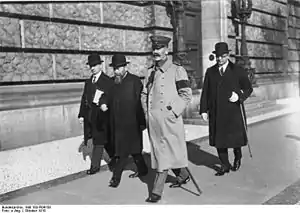Baden cabinet
The Baden cabinet (German: Kabinett Baden) was the final Reichsregierung or Imperial Government of the German Empire. It was formed on 4 October 1918 by Prince Max von Baden, who had been appointed as Reichskanzler (Chancellor) the day before by Emperor Wilhelm II.[1] It was the first cabinet of the Empire to include members of the Social Democratic Party of Germany (SPD). After the constitution was changed in late October 1918, the Chancellor and his government were for the first time accountable to the Reichstag (parliament). Previous governments had been accountable just to the Emperor.[2][3]:6

The cabinet would be in office only until 9 November 1918. As a result of the German Revolution, Max von Baden resigned that day, after having announced the abdication of the Emperor. The social democrat Friedrich Ebert took over as Chancellor.[4]:83–90
The members of the cabinet (most of them known as Staatssekretäre or "Secretaries of State") were as follows: [5][6]
| Cabinet Baden 4 October to 9 November 1918 | ||
|---|---|---|
| Reichskanzler | Max von Baden | no party affiliation |
| Vice-Chancellor | Friedrich von Payer | FVP |
| Auswärtiges Amt (Foreign Office) | Wilhelm Solf | non-affiliated liberal |
| Reichsamt des Innern (Interior) | Max Wallraf (through 6 October 1918) Karl Trimborn | non-affiliated conservative Zentrum |
| Reichsjustizamt (Justice) | Paul von Krause | non-affiliated national-liberal |
| Reichsmarineamt (Navy)[note 1][7] | Ernst Karl August Klemens von Mann | non-affiliated |
| Reichswirtschaftsamt (Economics) | Hans Karl von Stein zu Nord- und Ostheim | non-affiliated |
| Kriegsernährungsamt (Food) | Wilhelm von Waldow | non-affiliated conservative |
| Reichsarbeitsamt (Labour) | Gustav Bauer | SPD |
| Reichspostamt (Mail) | Otto Rüdlin | non-affiliated |
| Reichsschatzamt (Treasury) | Siegfried Graf von Roedern | non-affiliated |
| Reichskolonialamt (Colonies) | Wilhelm Solf | non-affiliated liberal |
| Without portfolio | Philipp Scheidemann Matthias Erzberger Adolf Gröber Conrad Haußmann (after 14 October 1918) | SPD Zentrum Zentrum FVP |
Notes
- There is some confusion about the position of Staatssekretär im Reichsmarineamt. But it seems that both Eduard von Capelle and his successor Paul Behncke resigned before Max von Baden became Chancellor and were thus only part of the cabinet of Georg von Hertling.
References
- "Biografie Prinz Max von Baden (German)". Deutsches Historisches Museum. Archived from the original on 2 July 2014. Retrieved 22 July 2013.
- "Gesetz zur Abänderung der Reichsverfassung 28. Oktober 1918 (Original text of the law, German)". Deutsches Historisches Museum. Retrieved 9 August 2013.
- Sturm, Reinhard (2011). "Weimarer Republik, Informationen zur politischen Bildung, Nr. 261 (German)". Bonn: Bundeszentrale für politische Bildung. ISSN 0046-9408. Retrieved 9 August 2013. Cite journal requires
|journal=(help) - Haffner, Sebastian (2002). Die deutsche Revolution 1918/19 (German). Kindler. ISBN 3-463-40423-0.
- Spuler, B. (ed.) (1962). Regenten und Regierungen der Welt, Volumes 2,3. Neueste Zeit: 1492–1917 (German). Ploetz, Würzburg.CS1 maint: extra text: authors list (link)
- "Die neuen Männer. Flugblatt zur Regierungsbildung des Kabinetts unter Prinz Max von Baden (German)". Deutsches Historisches Museum. Retrieved 12 August 2013.
- "Bio Eduard von Capelle (German)". Bayerische Staatsbibliothek. Retrieved 12 August 2013.
- Hildebrand, Hans H. (1988). Deutschlands Admirale 1849–1945 Band 1: A-G (German). Biblio Verlag, Osnabrück. pp. 87–88. ISBN 3-7648-1499-3.
